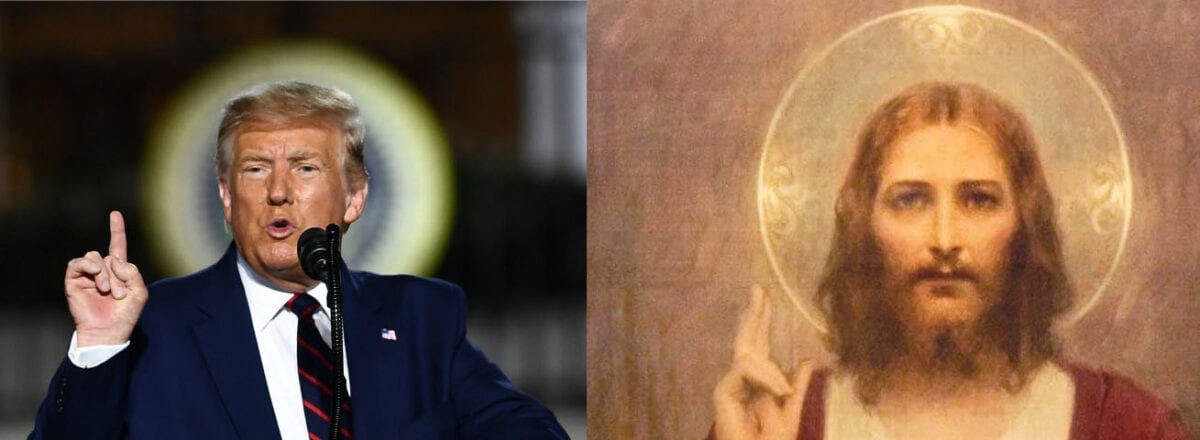“Nobody ever went broke underestimating the intelligence of the American public.”
– H. L. Mencken

New American Journal graphic
The Big Picture –
By Glynn Wilson –
Time is running short.
There’s only a couple of months left in the campaign to see who will emerge as the winner in the presidential election of 2020.
No pressure. At stake are only the fate of American democracy and the planet.
So let us pray.
Or better yet, get to work.
I’ve been to the mountain top and delved into the mass appeal of Donald Trump. Going beyond the obvious tweets of simple racism, there seems to be more to his appeal than meets the eye.
I submit that it is a mass messiah complex, a term from psychology normally reserved for individuals and also expressed as a Christ complex, a savior complex or god complex.
As a state of mind, an individual holds a belief that they are destined to become a savior today or in the near future.
Clearly Donald Trump holds such a belief.
“I am the chosen one,” Donald Trump declared to reporters on the White House lawn, looking toward the heavens.
President Trump: "I am the chosen one."
Full video here: https://t.co/BEh8qCGe79 pic.twitter.com/6pbll1a0NT
— CSPAN (@cspan) August 21, 2019
This term is not addressed in the Diagnostic and Statistical Manual of Mental Disorders. It is not a clinical term nor diagnosable disorder, but the symptoms of the disorder closely resemble those found in individuals suffering from delusions of grandeur or that they have grandiose self-images that veer towards the delusional.
The messiah complex is most often reported in patients suffering from bipolar disorder and schizophrenia. When a messiah complex is manifested within a religious individual after a visit to Jerusalem, it may be identified as a psychosis known as Jerusalem syndrome.
The messiah complex in such individuals can cause unimaginable consequences when combined with narcissistic and paranoid traits, often associated with Germany’s Adolf Hitler.
But what about the concept in sociological terms, as in why groups of people fall in line with a self-proclaimed messiah?
We’ve already covered how Trump exploits existential anxiety to manipulate the masses.
Related coverage: How Existential Anxiety Leads to Authoritarianism
Is he also able to use symbolism to lead enough of the people into believing that he is the chosen one?
What percent of the population is susceptible to this way of thinking?
While religious belief in the United States has been in decline for some time, 65 percent of American adults still describe themselves as Christians, even though that’s down 12 percentage points over the past decade, according to surveys from the Pew Research Center. Meanwhile, the religiously unaffiliated share of the population, consisting of people who describe their religious identity as atheist, agnostic or “nothing in particular,” now stands at 26 percent, up from 17 percent in 2009.
Still, if 65 percent of people say they believe, might they be more susceptible to political manipulation than those who don’t?
Of course there are different views of Christianity, ranging from the merciful messiah to the warrior king.
Even Democrat Joe Biden emphasized his “faith” during the virtual Democratic National Convention, giving comfort to Democrats who follow the myth of the merciful messiah. Republican Christians who follow the likes of Trump are clearly more in line with the myth of the warrior king, a Jewish view of the messiah put forward in the Dead Sea Scrolls.
If you are going to accurately handicap a national election, there is more to it than following the polls of popular support. Elections are won in the Electoral College, and that comes down to a few key battleground states.
Too bad we don’t have accurate breakdowns of religiosity in those states, along with a measure of the Intelligence Quotient (IQ) of the population.
Pollsters can tell you that the vast majority of Trump’s support comes from working class white people without a college degree. It seemed to come as a shock to elite pundits in New York and Washington, D.C. that they make up a large enough minority of the population to elevate Trump in the Electoral College in 2016.
Digging around in the numbers this week, I took a close look at IQ.
It is said that it takes an IQ of about 115 just to successfully complete an undergraduate university degree program. That’s one standard deviation above the mean. The mean or average IQ in a population is 100.
The depressing news for our election system is that nearly 85 percent of the people have an IQ below 115. Only about 16 percent have an IQ above 115.
Furthermore, only about 2-5 percent have an IQ of more than 130, two standard deviations above the mean, and only one percent or less have an IQ above 145, three standard deviations above the mean.
Implication: There are far more people out there with low IQs than there are with high IQs, which Trump knows. Communicating with them is far more important than communicating with the smaller number of people with a college education who read newspapers like the New York Times.
Remember this?
“The day I realized it can be smart to be shallow was, for me, a deep experience.”
– Donald J. Trump
Related Coverage : How Wrestle Mania Trumped Intelligence in U.S. Politics
There are about 328.2 million people in the U.S. and half of them don’t keep up with news and politics or vote at all. So toss them out of the sample, leaving about 164 million, counting people too young to vote.
In the presidential election of 2016, 128.8 million voted, 65,853,514 for the Democrat Hillary Clinton, or 48.2 percent, and 62,984,828 voted for the Republican Donald Trump, or 46.1 percent. Still, Trump won 304 electoral votes to Clinton’s 227.
Can he repeat this fete in 2020?
Looking at the numbers back in July, I didn’t think so.
Related coverage: Not Since Nixon Has a President Been So Isolated and Hated: Trump Has to Go
But looking at the new numbers since the DNC and RNC, I’m not so sure.
The Biden-Harris ticket was leading by an aggregate of 10 points in the polls for the past few weeks. The Democrats did not get much of a bump in support from their virtual convention, even though more people watched it than the RNC. But at least according to one polling company, Trump got a 4 point bump from his White House show.
Related coverage: Trump’s RNC Gambit from the White House Cuts Into Biden’s Lead in the 2020 Election for President
The imagery of the Trump family campaigning with the White House as a backdrop, something never exploited by any president before, can have powerful effects on the margins on the motivations of low IQ and religious voters. Many look up to Trump as their savior in the political world.
Also take into account that low IQ and religious voters are undercounted in most polls. Sophisticated pollsters figured this out back in the 1990s because of “stealth” campaigns when the likes of Fob James got elected governor of Alabama even though he was trailing in the polls. Since then, pollsters have added weighting mechanisms to account for those who will not answer pollster’s questions on the phone.
Couple that with millions of dollars to manipulate voters with advertising on television and social media, along with the phenomenon of fake news, and you have a recipe for disaster. It will takes lots of smarts to overcome it.
So the question is, can the Democrats mount enough of a campaign over the next two months to ramp up voter turnout and peel away enough Trump supporters to win in a landslide?
Barack Obama won in 2008 and 2012 with 57 percent of the popular vote nationally, enough to carry the Electoral College in a landslide. Obama won 365 electoral votes to 173 for John McCain in 2008, at a time when the country was down on Republican George W. Bush for the Great Recession and the ill-conceived war in Iraq. Bush left office with a public approval rating of below 30 percent.
Can Joe Biden and Kamala Harris rise to the occasion and match Obama’s numbers?
Is Trump’s mishandling of the coronavirus pandemic and the economy enough to convince some who voted for Trump to either stay home or vote for a Democrat this time around?
Will the attack on the U.S. Post Office wake enough people up to the possibility that Trump is trying to steal the election? Or will the counter story accusing Democrats of voter fraud even that out?
Related coverage: President Trump Makes No Secret of Conspiracy to Gut Mail Voting: Senators Urge USPS to Fix Delays and Avoid Cost Increases Ahead of November Election
Will Trump’s subtle threats to privatize Social Security and Medicaid motivate people to show up and vote?
Related coverage: U.S. Senator Doug Jones of Alabama Blasts President Trump for Trying to Defund Medicare and Privatize Social Security
Will there be an “October surprise,” like Trump approving a COVID vaccine or Democrats coming up with some new dirt on Trump?
We will be watching and covering the news from here. We hope enough people are paying attention to turn things around in this election.
The most compelling argument for what’s at stake during the DNC came from former President Obama in his video address from Constitution Hall in Philadelphia. Are enough people listening?
I just don’t know. I hope so.
Related coverage: President Obama Speaks on Existential Threats to Democracy from Independence Hall













